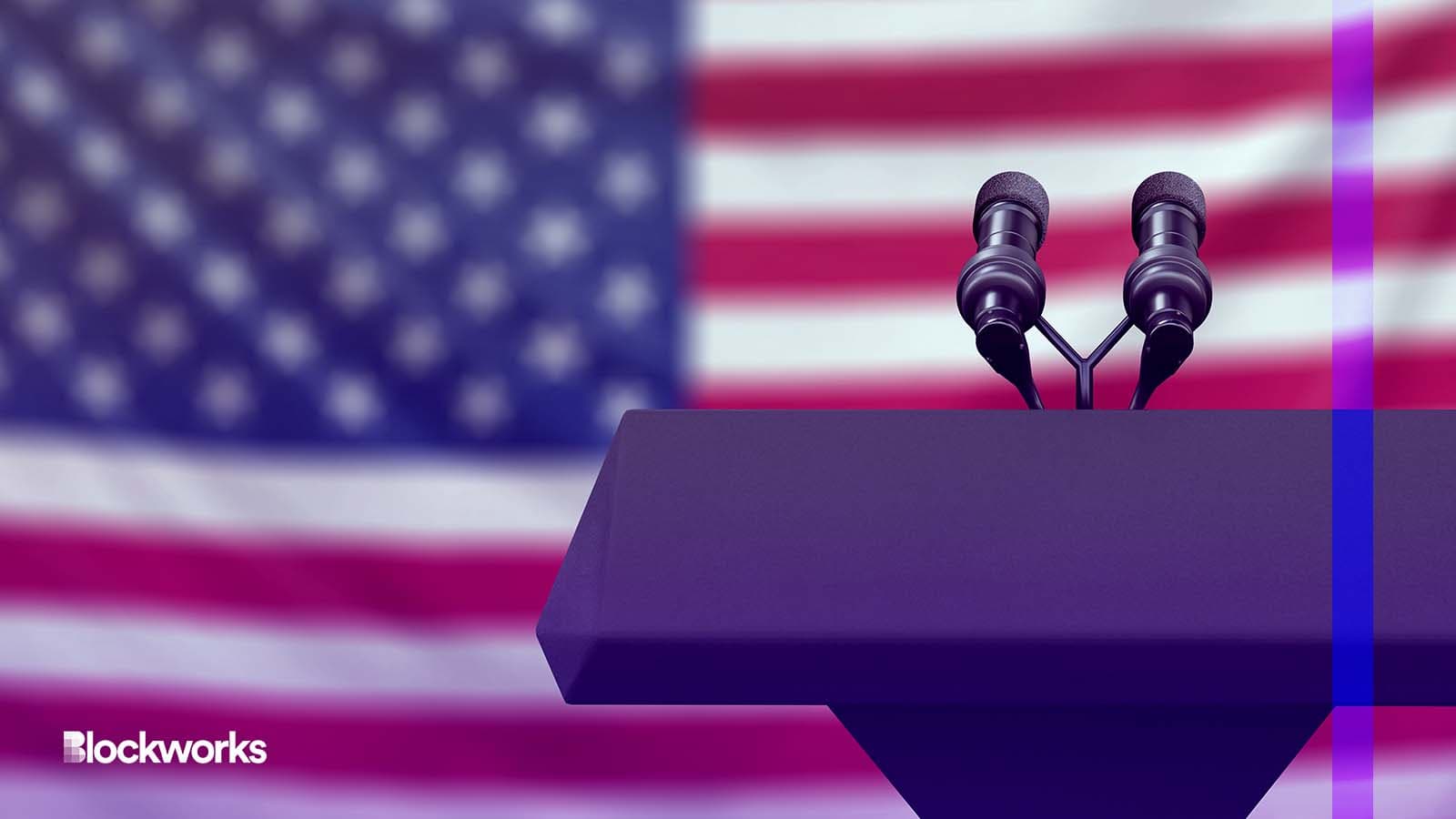Give Crypto the Presidential Stage
Bringing debate on crypto to the presidential level could force real action after this next election

Derek Brumby/Shutterstock modified by Blockworks
A new electoral cycle has begun.
President Biden formally announced his 2024 presidential campaign, and Florida Governor Ron DeSantis is expected to announce his intent to join Donald Trump in the Republican primary field later this month.
During the last presidential debates in 2020, there was no mention of digital assets. Back then, the total market cap for all cryptocurrencies was $300 billion. The crypto market has since peaked at $3 trillion in 2021, and currently sits at $1.2 trillion.
Industry growth of this scale is hard to ignore.
As we commence this new election cycle, the national conversation around crypto could reach its biggest platform yet — the presidential debate stage.
The crypto world is listening carefully and the long-term consequences are massive.
If both sides are able to get their houses in order, there is potential for voters to swing to one side or the other on the back of Bitcoin and the young Americans interested in it.
To the left, to the right
The zeitgeist of crypto is unmistakably Libertarian, which at its core is neither politically left nor right.
However, this has been rapidly changing in recent months, as the industry has had a front row seat to recent exchanges between Republican representatives and SEC Chair Gary Gensler, demonstrating just how partisan the issue of crypto regulation has become.
The current administration initially heeded crypto. Some even accused it of mollycoddling Sam Bankman Fried until FTX’s collapse.
But after originally hearing out Bankman-Fried’s plan to regulate crypto and signaling new policy could be on the way under the purview of the CFTC, the second half of this current presidential term has been marked by a sharp turn away from the space. Some prominent Democratic senators, including Elizabeth Warren, as well as SEC Chair Gensler, have been at the forefront of recent hearings and leading the charge against further innovation in the space.
During these hearings, legislators and regulators laid out attempts to make an industry that could hardly be imagined more than 20 years ago fit into regulatory frameworks nearly a century old.
Crypto not only stands as an alternative financial system, but also offers a new avenue for transparency, efficiency and innovation at a time when leaders are still seemingly living in the past. In the coming election, Gen Z and Millennials will make up a significantly larger proportion of the electorate.
The Left will find itself in a dilemma once it realizes that — despite sustaining heavy losses from a handful of major crypto scandals and hacks — a lot of this younger generation that grew up tech native still has a soft spot for the sector. These are people that have grown up on social media: the same social media that was weaponized in the last election and has served to further polarize US politics.
The Right has a large opportunity to sway young voters to their side and could win credit by showing support for the industry. Republicans are usually less in favor of regulation, but in this case, no new policies are tantamount to a ban on a whole new industry. Ironically, it is then the Republicans who end up asking for clear policy changes to help this new industry gain clarity and remain competitive vs. other nations looking to usurp the US lead.
However, other Democratic senators still do remain very open to the possibilities of this nascent industry. Congress already realizes that the US should not be blocked out and left behind, but the sensationalized view from what is visible in the media gives the impression that there is little chance of progress under the current administration.
Up next on the presidential stage
The crypto industry should be forgiven for harboring some confusion on where it stands in the eyes of the US government when both partisan and bipartisan groups appear to be squaring off.
On the Republican side, some leading presidential candidates such as DeSantis are unabashedly pro-crypto, while others, noting how political donations have flown from crypto industries to their opponents, are prepared to cross the aisle to increase scrutiny on the industry.
DeSantis has already made efforts to make crypto support a cornerstone of his campaign, taking measures to make it easier to conduct crypto business in Florida.
Trump is likely to appropriate the pro-crypto narrative given the extremely polarized political climate that currently exists around the topic today. Not to mention his foray into the world of NFTs.
On the Democratic side, it is increasingly clear that Biden’s stance on cryptocurrency in 2024 will likely be unfavorable. He recently took to Twitter to address the issue of crypto tax loopholes, though the specific tax framework to which he is alluding remains unclear.
The crypto industry has never been so heavily featured in the national conversation before, so this is somewhat uncharted territory.
The United States and its regulatory bodies possess the unique resources and experience necessary to establish a globally enforceable framework that is fair and orderly.
Regardless of the outcome to the presidential race, having the conversation at a national level will push decisionmakers to finally act, rather than debate.






